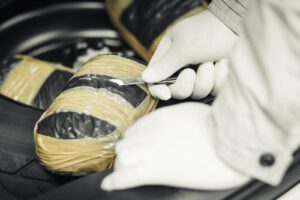 Chief Justice Rabner continued: In criminal cases up until now, the Court has used the Frye standard to assess reliability. Decided a century ago, Frye involved a defendant’s effort to introduce evidence of a blood pressure test that could purportedly reveal whether a person was telling the truth. 293 F. at 1013. The Frye court’s analysis appears in a single paragraph of its two-page ruling and states in part that, “while courts will go a long way in admitting expert testimony deduced from a well-recognized scientific principle or discovery, the thing from which the deduction is made must be sufficiently established to have gained general acceptance in the particular field in which it belongs.” Id. at 1014 (emphasis added). The opinion does not cite any legal authority. The “general acceptance” standard stems from the underscored language and can be difficult to satisfy.
Chief Justice Rabner continued: In criminal cases up until now, the Court has used the Frye standard to assess reliability. Decided a century ago, Frye involved a defendant’s effort to introduce evidence of a blood pressure test that could purportedly reveal whether a person was telling the truth. 293 F. at 1013. The Frye court’s analysis appears in a single paragraph of its two-page ruling and states in part that, “while courts will go a long way in admitting expert testimony deduced from a well-recognized scientific principle or discovery, the thing from which the deduction is made must be sufficiently established to have gained general acceptance in the particular field in which it belongs.” Id. at 1014 (emphasis added). The opinion does not cite any legal authority. The “general acceptance” standard stems from the underscored language and can be difficult to satisfy.
In civil cases, to determine the reliability of expert testimony, the focus today is on the methodology and reasoning underlying the evidence. That approach is guided by a non-exhaustive list of factors outlined in Daubert. The Court was in the vanguard of courts to shift from exclusive reliance on Frye’s “general acceptance” standard to a methodology-based approach in civil cases, and it began to do so even before Daubert, in which the United States Supreme Court rejected the Frye standard and held that Frye had been “superseded by the adoption of the Federal Rules of Evidence.” 509 U.S. at 587.
Daubert outlined a new methodology-based standard to determine the admissibility of proffered expert scientific testimony: “[W]hether the expert is proposing to testify to (1) scientific knowledge that (2) will assist the trier of fact to understand or determine a fact in issue.” Id. at 592. That “entails a preliminary assessment of whether the reasoning or methodology underlying the testimony is scientifically valid and . . . properly can be applied to the facts in issue.” Id. at 592-93.
The rationale underlying the second prong is that opinion evidence is generally disfavored unless it is necessary. This is because expert opinion evidence has a strong tendency to unduly influence a fact-finder, especially juries.
